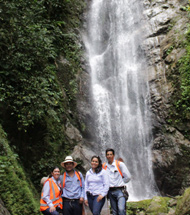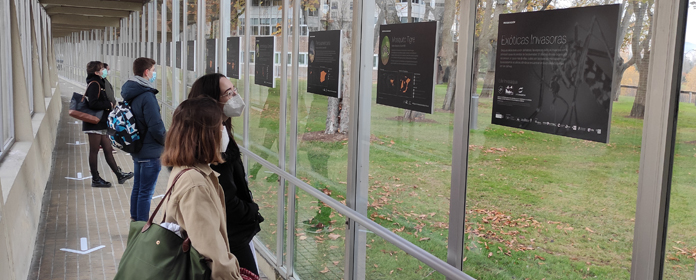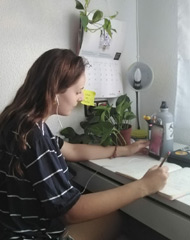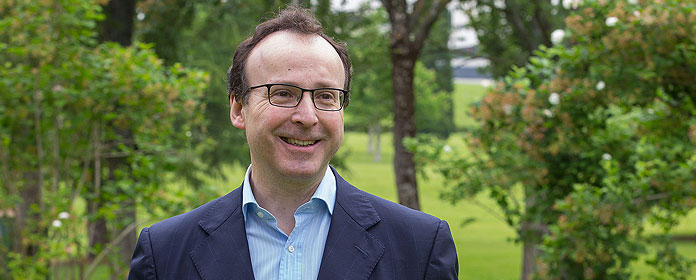"The Master's Degree in Biodiversity, Landscapes and Sustainable management gave us that holistic view on landscapes that is required for my work"
Manuela Palacios attended the postgraduate program, after which she returned to Colombia, where she has participated in numerous projects since then.

Manuela Palacios (Master's Degree in Biodiversity, Landscapes and Sustainable management 2012) came from Colombia to the University looking for a postgraduate program on management integral landscape that she could not find in her country. After graduating, she has worked, among others, at the Colombian Ministry of Environment, with the high school Alexander Von Humboldt Research and at the consultancy service in engineering WSP Parsons Brinckerhoff, where she is currently located.
From the perspective of the last 4 years of work experience she is clear that Master's Degree has been "a tool to be competitive in the workplace".
- In which project are you currently working?
Currently I am meeting linked to a professional services signature of consultancy service in engineering, called WSP Parsons Brinckerhoff. work in the department of Environment in Colombia, where I am in charge of defining areas of environmental influence of projects, to perform the characterization of the landscape component and the fragmentation of terrestrial ecosystems for the programs of study of environmental impact and environmental management plans that are required for the development of engineering projects.
programs of study During my time at business I have participated in socio-environmental characterizations, environmental impact assessments, and management plans for pipeline and power line construction projects in different regions of Colombia.
 - How do you apply in your daily work the knowledge acquired during your degree program and in the Master's Degree in Biodiversity, Landscapes and Sustainable management ?
- How do you apply in your daily work the knowledge acquired during your degree program and in the Master's Degree in Biodiversity, Landscapes and Sustainable management ?
As part of the daily work work with a team multidisciplinary which is in charge of assessing different components. That is, work with biologists specializing in birds, herps and mammals; with foresters, environmental engineers, professionals in the social area , civil engineers, electrical engineers, hydrologists, agronomists and geologists, who are responsible for analyzing different independent aspects of the territory to implement the project.
As an ecologist in charge of defining areas of environmental influence, I carry out landscape characterization and analyze the possible fragmentation of ecosystems. In this work I have to integrate the different aspects, understand the technical specifications of project and identify relevant characteristics of the territory to evaluate the environmental impacts.
- How did you acquire this training multidisciplinary ?
Precisely the Master's Degree gave us that integral vision on landscapes that is required for my work, where biodiversity and sustainable management were included. During the postgraduate program we had the opportunity to know the different faces of the environmental management from different sectors and actors of the development. That training has given me the basis to integrate a knowledge applicable to a given territorial context.
In addition, Master's Degree trains you in the use of fundamental tools nowadays, such as geographic information systems, through which I integrate several landscape and ecosystem variables to analyze the impact on the landscape and the possible fragmentation of ecosystems.
- As an ecologist, you have participated in several projects during your professional degree program . What has each of them contributed to you?
At the beginning of my professional degree program , I focused on work with communities of ethnic groups to understand the management and environmental conflicts that occur on their territories and propose management measures that contribute to the cultural and environmental preservation of their territories. Later on, I worked in the field of conservation at the National Natural Parks Unit of Colombia, developing management plans for protected areas with the participation of local communities. From this field I learned about the immense challenges of development and the conservation of natural areas.
In the Colombian Ministry of Environment I worked in the elaboration of environmental policies from a new prism, which was the management integral. From this perspective we defined the National Policy for the Integral management of the resource Water , the National Policy for the Integral management of Biodiversity and Ecosystem Services and the update of the National Forestry Plan. The governmental experience helped me to get to know the work on that side of the barrier and to be more aware of the difficulties of taking ideas to the internship.
I have also collaborated with high school Alexander Von Humboldt Research. This opportunity has allowed me to meet and work with renowned researchers on how to implement biodiversity policies.
- You have worked both for the Colombian government on conservation issues and for private companies linked to the hydrocarbon area . Do you think that the training of ecologists and biologists allows precisely that adaptation to such diverse areas of work ?
To address an environmental conflict requires integral thinking that has different knowledge in areas of natural and social sciences, and to generate the ability to understand different dynamics to propose alternatives.
The training of ecologists provides some of the tools required to generate such thinking. Although a few years ago it was thought that ecologists could only work in the environmental sector, today it is recognized the versatility they can have and that is why I have colleagues who are currently working in the Ministry of Education, in the Ministry of Agriculture, in oil companies, in National Parks, in publishing houses, in environmental research institutes and in the field of environmental legislation.
- If you had to highlight two advantages that the Master's Degree in Biodiversity, Landscapes and Sustainable management brought you when looking for new employment opportunities, what would you highlight?
In Colombia there are no higher programs of study to deepen in that area of knowledge. Hence, the first advantage is the differentiation of the training provided by the MBPGS. In addition, the Master's Degree has a great application in different work environments, so it is a tool to be competitive in the work environment. Especially for me in the field of territorial environmental planning.
On the other hand, within Master's Degree the study of different tools -such as geographic information systems for research in environmental issues- has allowed me to have more knowledge to facilitate the analysis of possible impacts to ecosystems and landscapes.
Finally, one of the great advantages of the MBPGS is that it provides, in addition to an important amount of knowledge through different professionals, methodologies and tools to apply this knowledge to any territorial context.




